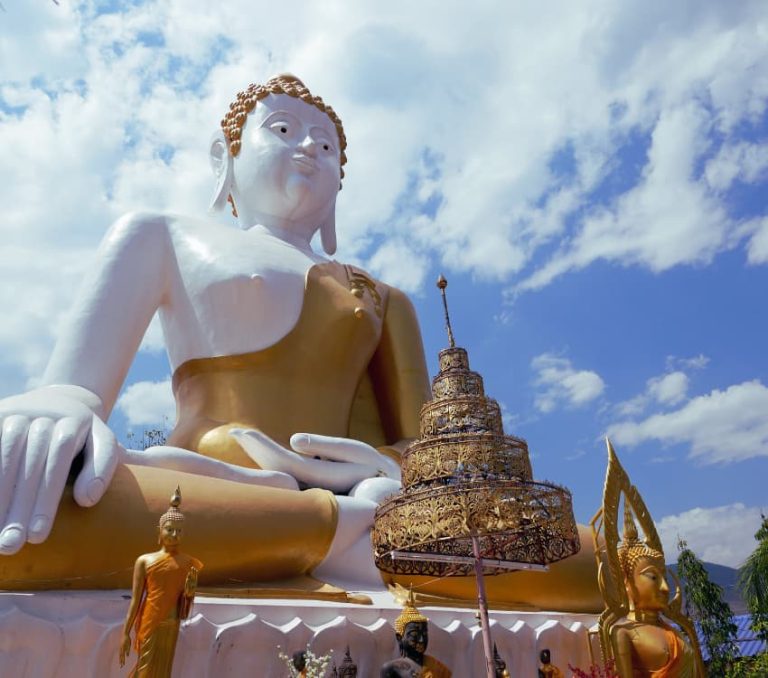Vipassana meditation, an ancient practice from India, has been gaining popularity worldwide due to its profound impact on physical and mental well-being. Vipassana, which means “to see things as they are,” is a technique that emphasises mindfulness and self-awareness, enabling practitioners to gain insight into the true nature of reality. Individuals practising Vipassana are better equipped to navigate life’s challenges with clarity, compassion, and equanimity by cultivating a deep understanding of oneself and the world.
In today’s fast-paced, technology-driven world, many seek ways to alleviate stress, improve mental health, and achieve inner peace. As a result, mindfulness practices, including Vipassana meditation, have garnered substantial interest. Rooted in Buddhist teachings, Vipassana meditation is now embraced by people from various backgrounds and belief systems, transcending its religious origins to become a widely accepted method for personal growth and self-discovery.
Understanding the physical and mental benefits of Vipassana meditation is essential for individuals considering incorporating the practice into their lives. By examining the science behind Vipassana’s impact on the body and mind, we can gain a deeper appreciation for its transformative potential.
Origins and Principles of Vipassana Meditation
Vipassana meditation is rooted in ancient India, where the Buddha taught it more than 2,500 years ago. The practice was preserved and passed down through generations of Buddhist monks, eventually spreading to other parts of Asia, such as Myanmar, Thailand, and Sri Lanka. In the 20th century, Vipassana meditation began to gain recognition in the Western world, thanks to teachers like S. N. Goenka, who played a pivotal role in popularising the practice globally. Today, Vipassana meditation is taught in numerous countries and has become an integral part of the mindfulness movement, transcending cultural and religious boundaries.
Core teachings of Vipassana
At the heart of Vipassana meditation is the cultivation of mindfulness, which involves paying close attention to one’s thoughts, emotions, and bodily sensations without judgment. This non-reactive observation allows practitioners to develop a deeper understanding of their inner experiences, fostering self-awareness and insight into the impermanent nature of reality. Vipassana meditation also emphasises the cultivation of equanimity or maintaining a balanced mental state, regardless of the circumstances. By practising equanimity, individuals can better navigate life’s ups and downs with calm and composure.
The three pillars of Vipassana meditation: morality, concentration, and wisdom
Vipassana meditation is built upon three fundamental pillars: morality (sila), concentration (samadhi), and wisdom (Panna). These three components support the practitioner’s journey towards self-discovery and enlightenment.
Morality (sila): The foundation of Vipassana practice, morality involves living an ethical life by adhering to guidelines such as refraining from harming others, lying, stealing, engaging in sexual misconduct, and consuming intoxicants. Practising morality creates a stable and harmonious environment conducive to meditation and personal growth.
Concentration (samadhi): Developing concentration is essential for achieving mental clarity and focus during meditation. Vipassana practitioners typically begin by concentrating on their breath or bodily sensations, which helps to calm the mind and eliminate distractions. As concentration deepens, meditators can better observe their thoughts and emotions subtle, ever-changing nature.
Wisdom (panna): The ultimate goal of Vipassana meditation is to cultivate wisdom or insight into the true nature of reality. By practising mindfulness and developing concentration, practitioners can understand existence’s impermanent, unsatisfactory, and selfless character. This wisdom ultimately leads to the cessation of suffering and enlightenment or nirvana.
Vipassana Meditation Techniques
Anapana: Focusing on the breath
Anapana is a fundamental Vipassana meditation technique focusing on one’s breath as it naturally flows in and out of the body. By observing the sensations of the breath, such as the feeling of air passing through the nostrils or the rise and fall of the abdomen, practitioners can develop greater concentration and mindfulness. This simple yet powerful practice serves as a foundation for deeper meditation. It helps calm the mind, enabling individuals to better observe their thoughts and emotions without becoming entangled.
Body scanning: Cultivating mindfulness of sensations
Body scanning is another essential technique in Vipassana meditation, which systematically observes bodily sensations. The purpose of body scanning is to cultivate mindfulness of the body’s ever-changing feelings and to develop a deeper understanding of the impermanent nature of all phenomena. Starting at the top of the head and moving down to the toes, practitioners pay close attention to any physical sensations they experience, such as tingling, warmth, pressure, or pain. By practising body scanning regularly, individuals can gain greater insight into the interconnectedness of the mind and body, leading to increased self-awareness and a more profound meditation experience.
Metta Bhavana: Developing loving-kindness
Metta Bhavana, or loving-kindness meditation, is a complementary practice to Vipassana that focuses on cultivating love, compassion, and goodwill towards oneself and others. While not a core technique of Vipassana, Metta Bhavana is often taught alongside Vipassana meditation to help practitioners develop a balanced, compassionate attitude towards their inner experiences.
To practice Metta Bhavana, individuals silently repeat phrases such as “May I be happy, may I be healthy, may I be safe, may I live with ease,” and gradually extend these well-wishes to others, including loved ones, acquaintances, and even those they may have difficulty with. By cultivating loving-kindness, practitioners can develop greater empathy, compassion, and emotional resilience, further supporting their journey towards self-discovery and inner peace.
Physical Benefits of Vipassana Meditation
Stress reduction and relaxation
One of the most significant physical benefits of Vipassana meditation is its ability to reduce stress and promote relaxation. By focusing on the breath and bodily sensations, practitioners can shift their attention away from stress-inducing thoughts and experiences. This process helps to activate the body’s relaxation response, leading to a decrease in the production of stress hormones, such as cortisol, and an increase in the release of feel-good neurotransmitters like endorphins.
Improved immune system functioning
Vipassana meditation can support physical well-being by enhancing the body’s ability to ward off infections and maintain overall health. Regular practice of Vipassana meditation has been linked to improved immune system functioning. Reducing stress and promoting relaxation contribute to a more robust immune system, as chronic stress is known to weaken the immune response.
Lowered blood pressure and heart rate
Vipassana meditation has been shown to help lower blood pressure and heart rate in both healthy individuals and those with pre-existing cardiovascular conditions. The practice’s stress-reducing effects can decrease blood pressure, reducing the risk of hypertension and other cardiovascular issues. Additionally, Vipassana meditation can help to lower heart rate, contributing to a more relaxed and calm state of being.
Enhanced sleep quality
Poor sleep quality is often linked to stress, anxiety, and an overactive mind. Vipassana meditation can help to improve sleep quality by promoting relaxation and reducing stress, allowing practitioners to experience more profound, more restorative sleep. Moreover, the increased self-awareness and mindfulness cultivated through Vipassana meditation can help individuals recognise and address factors contributing to sleep disturbances, such as negative thought patterns or unresolved emotions.
Reduced chronic pain
Vipassana meditation has been shown to help alleviate chronic pain in some individuals. By cultivating mindfulness and non-judgmental awareness of bodily sensations, practitioners can develop a different relationship with their pain, learning to observe it without becoming overwhelmed. This shift in perspective can lead to a reduction in the perceived intensity of pain and an increased ability to cope with chronic pain conditions. Additionally, the relaxation and stress reduction associated with Vipassana meditation can decrease pain levels by reducing muscle tension and promoting overall physical well-being.
Mental Benefits of Vipassana Meditation
Increased self-awareness and emotional intelligence
Vipassana meditation helps to cultivate greater self-awareness by encouraging practitioners to observe their thoughts, emotions, and bodily sensations without judgment. This heightened sense of self-awareness can lead to increased emotional intelligence, allowing individuals to understand their emotional responses better and empathise with the emotions of others. As a result, practitioners often develop stronger interpersonal relationships and more effective communication skills.
Enhanced focus, clarity, and cognitive function
Regular Vipassana meditation can improve focus, mental clarity, and overall cognitive function. By training the mind to concentrate on the breath and bodily sensations, practitioners develop the ability to maintain sustained attention and filter out distractions more effectively. This enhanced focus can carry over into daily life, improving productivity and problem-solving skills.
Better emotional regulation and resilience
Vipassana meditation encourages individuals to observe their emotions without becoming attached to them, fostering better emotional regulation and resilience. Practitioners learn to recognise emotional patterns and develop the skills to respond to dynamic challenges more balanced and constructively. This improved emotional resilience can help individuals navigate life’s ups and downs with greater ease and stability.
Reduction of anxiety, depression, and other mental health issues
Numerous studies have shown that Vipassana meditation can effectively reduce symptoms of anxiety, depression, and other mental health issues. By promoting relaxation, mindfulness, and non-judgmental self-awareness, Vipassana meditation can help to alleviate negative thought patterns and emotional distress. For some individuals, regular meditation may be a valuable adjunct to conventional mental health treatments, providing additional support and relief from symptoms.
Cultivation of inner peace, happiness, and overall well-being
Vipassana meditation can contribute to a greater sense of inner peace, happiness, and overall well-being by fostering a deeper understanding of oneself and the impermanent nature of reality. As practitioners develop increased self-awareness, emotional intelligence, and resilience, they often experience a greater sense of contentment and satisfaction. By cultivating a more mindful and balanced approach to life, individuals can experience lasting positive changes in their mental well-being and overall life satisfaction.
The Science Behind Vipassana Meditation’s Benefits
One of the key scientific concepts underlying the benefits of Vipassana meditation is neuroplasticity, the brain’s ability to change and adapt throughout an individual’s life. Through consistent meditation, individuals can effectively “re-wire” their brains, creating new neural connections and pathways that support enhanced cognitive function, emotional regulation, and overall mental well-being. This process of neuroplasticity allows for lasting changes in the brain’s structure and function, leading to the numerous benefits associated with Vipassana meditation.
Effects of Vipassana meditation on the brain’s structure and function
Research has shown that regular Vipassana meditation can lead to observable brain structure and function changes. Some of the key findings include:
Increased grey matter density: Studies have shown that meditation can increase grey matter density in various brain regions, such as the hippocampus (involved in learning and memory) and the prefrontal cortex (involved in executive functions like decision-making and self-control).
Enhanced connectivity between brain regions: Vipassana meditation has been linked to improved connectivity between different brain areas, supporting enhanced cognitive function and emotional regulation.
Reduced activity in the default mode network (DMN): The DMN is a network of brain regions active when the mind wanders and engages in self-referential thinking. Vipassana meditation has been shown to reduce activity in the DMN, leading to decreased mind-wandering and improved focus.
The role of mindfulness in stress reduction and mental health improvement
Mindfulness, the cornerstone of Vipassana meditation, is crucial in reducing stress and improving mental health. By cultivating a non-judgmental awareness of one’s thoughts, emotions, and bodily sensations, individuals can learn to observe their inner experiences without becoming overwhelmed or reactive. This mindful approach allows practitioners to manage stress and emotional challenges better, leading to improved mental health and well-being.
How to Incorporate Vipassana Meditation into Your Life
Developing a consistent Vipassana meditation practice is vital to reaping its numerous physical and mental benefits. Here are some tips to help you establish a regular meditation routine:
Set a specific time and place: Dedicate a particular time and place for your daily meditation practice. Choose a quiet, comfortable space free from distractions, and aim to meditate simultaneously each day to establish consistency.
Start with short sessions: Begin with brief meditation sessions of 10 to 15 minutes and gradually increase the duration as you become more comfortable with the practice.
Be patient and gentle with yourself: It’s natural for the mind to wander during meditation. When you notice your mind drifting, gently bring your focus back to your breath or bodily sensations without judgment or frustration.
Use guided meditations: If you’re new to Vipassana meditation, consider using guided meditation resources, such as apps or online videos, to help you develop proper technique and maintain focus.
Connect with a community: Join a local meditation group or online community to share your experiences, ask questions, and receive support from fellow practitioners.
Attending a Vipassana retreat or course
Participating in a Vipassana retreat or course can be a transformative experience that deepens your meditation practice and understanding of the technique. These immersive programs typically last ten days and involve a structured meditation schedule, instruction, and group discussions. Retreats allow you to disconnect from daily life and focus solely on your meditation practice in a supportive, distraction-free environment.
Before attending a retreat, research the program and location to ensure it aligns with your needs and preferences. Remember that Vipassana retreats in Temples (Wat’s) often require a commitment to silence, minimal personal belongings, and adherence to a strict daily schedule.
Integrating mindfulness into daily activities
In addition to formal Vipassana meditation practice, integrating mindfulness into everyday activities can help you maintain a balanced and present state of mind. Here are some ways to incorporate mindfulness into your daily life:
Mindful eating: Pay attention to your food’s taste, texture, and aroma as you eat, savouring each bite and eating slowly.
Mindful walking: Focus on the sensation of your feet hitting the ground and the rhythm of your breath as you walk.
Mindful listening: Practice active listening during conversations, giving your full attention to the speaker without interrupting or formulating a response in your mind.
Mindful breaks: Set aside brief periods throughout the day to pause, take a few deep breaths, and check in with your thoughts, emotions, and bodily sensations.
Be Mindful
Vipassana meditation offers numerous physical and mental benefits that significantly improve well-being. These benefits include stress reduction, improved immune system functioning, lowered blood pressure and heart rate, enhanced sleep quality, and reduced chronic pain. On the mental side, Vipassana meditation can lead to increased self-awareness, emotional intelligence, improved focus and cognitive function, better emotional regulation, reduced anxiety and depression, and the cultivation of inner peace and happiness.
The practice of Vipassana meditation has the potential to bring about profound, transformative changes in one’s life. Individuals can develop a deeper understanding of themselves and the world around them by cultivating mindfulness, self-awareness, and emotional resilience. This increased self-knowledge can lead to more balanced, compassionate, and fulfilling relationships, improved mental health, and a greater sense of purpose and satisfaction in life.
Related Articles
- Vipassana Meditation: A Journey to Inner Peace
- Ayurvedic Principles of Thai Massage
- Exploring Vipassana Meditation Retreats in Chiang Mai
- Mastering the Art of Mindfulness: Vipassana Meditation Techniques
- Wat Umong Suan Phutthatham
Aleenta Retreat
Chiang Mai
Chiang Mai
189 Soi Ban Mai Lang Mo 18,
Suthep, Muang Chiang Mai District,
Chiang Mai 50200
T: +66 (0)52 090 333












